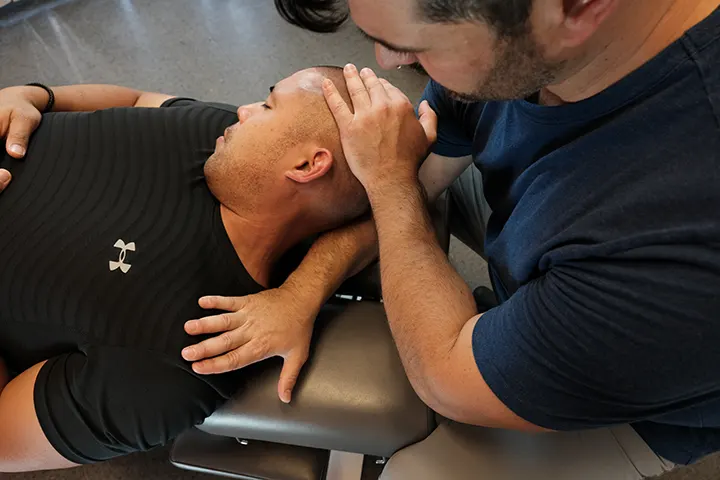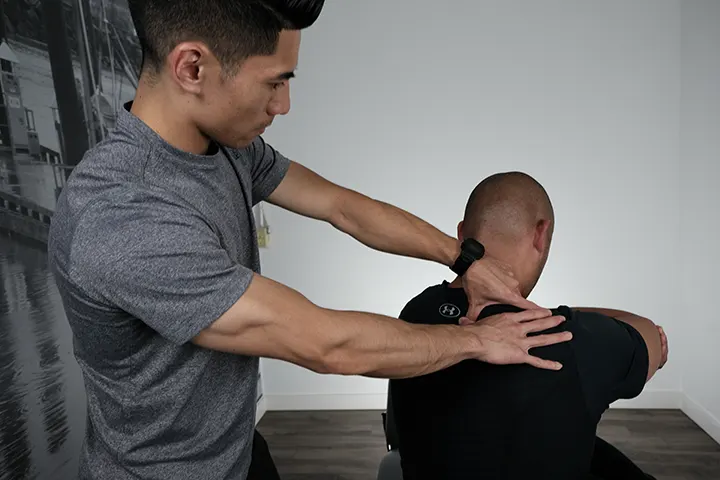A physiotherapist is a healthcare professional who specializes in promoting and restoring physical function, mobility, and overall well-being in individuals of all ages. Physiotherapists use a combination of manual techniques, exercise, education, and therapeutic modalities to assess, diagnose, and treat a wide range of physical conditions and injuries.
Physiotherapists begin by conducting a thorough assessment of the patient's physical condition, medical history, and specific concerns. This assessment helps them identify areas of dysfunction, pain, and limitations in movement.
Diagnosis Treatment Planning
Based on the assessment, the physiotherapist makes a diagnosis and develops a personalized treatment plan. The plan may include specific goals, targeted exercises, hands-on techniques, and other interventions to address the patient's needs.
Manual Therapy Techniques
Physiotherapists use a variety of hands-on techniques such as joint mobilization, soft tissue manipulation, and manual stretching to improve joint mobility, reduce pain, and enhance tissue flexibility.


They design and prescribe exercises tailored to the patient's condition and goals. These exercises help strengthen muscles, improve flexibility, restore balance, and promote functional recovery.
Pain Management
Physiotherapists work with patients experiencing pain due to injuries, surgeries, chronic conditions, or other causes. They employ techniques like heat or cold therapy, electrical stimulation, ultrasound, and other modalities to alleviate pain and promote healing.
Education
Physiotherapists educate patients about their condition, proper body mechanics, and strategies for preventing future injuries. They may also teach patients self-management techniques and exercises to continue their recovery at home.
Physiotherapists assist patients in regaining functional independence, whether it's returning to work, sports, or daily activities. They focus on improving movement patterns and facilitating activities that are important to the patient's lifestyle.
Post-Surgical Rehabilitation
Physiotherapists play a crucial role in helping patients recover after surgeries, such as joint replacements, ligament repairs, or spinal surgeries. They guide patients through appropriate exercises and therapies to restore strength and function.
Neurological
In cases of neurological conditions like stroke, spinal cord injuries, or multiple sclerosis, physiotherapists work to improve movement, balance, and coordination through specialized exercises and techniques.


Physiotherapists evaluate workplace ergonomics and provide recommendations to prevent repetitive strain injuries and promote healthy postures.
Collaboration
Physiotherapists may collaborate with other healthcare professionals, such as doctors, occupational therapists, Certified Athletic Therapists, RMT's and Chiropractors, to provide comprehensive care to their patients.
Overall, the goal of a physiotherapist is to optimize a patient's physical function, improve their quality of life, and empower them to manage their own health and well-being through movement and exercise. The specific techniques and approaches used by physiotherapists may vary based on the patient's condition and the therapist's expertise.
© Copyright Evolution Sport Therapy 2022.
Newsletter Signup
Sign up for our newsletter to receive all the latest!
A physiotherapist is a healthcare professional who specializes in promoting and restoring physical function, mobility, and overall well-being in individuals of all ages. Physiotherapists use a combination of manual techniques, exercise, education, and therapeutic modalities to assess, diagnose, and treat a wide range of physical conditions and injuries.

Physiotherapists begin by conducting a thorough assessment of the patient's physical condition, medical history, and specific concerns. This assessment helps them identify areas of dysfunction, pain, and limitations in movement.
Diagnosis Treatment Planning
Based on the assessment, the physiotherapist makes a diagnosis and develops a personalized treatment plan. The plan may include specific goals, targeted exercises, hands-on techniques, and other interventions to address the patient's needs.
Manual Therapy Techniques
Physiotherapists use a variety of hands-on techniques such as joint mobilization, soft tissue manipulation, and manual stretching to improve joint mobility, reduce pain, and enhance tissue flexibility.

They design and prescribe exercises tailored to the patient's condition and goals. These exercises help strengthen muscles, improve flexibility, restore balance, and promote functional recovery.
Pain Management
Physiotherapists work with patients experiencing pain due to injuries, surgeries, chronic conditions, or other causes. They employ techniques like heat or cold therapy, electrical stimulation, ultrasound, and other modalities to alleviate pain and promote healing.
Education
Physiotherapists educate patients about their condition, proper body mechanics, and strategies for preventing future injuries. They may also teach patients self-management techniques and exercises to continue their recovery at home.

Physiotherapists assist patients in regaining functional independence, whether it's returning to work, sports, or daily activities. They focus on improving movement patterns and facilitating activities that are important to the patient's lifestyle.
Post-Surgical Rehabilitation
Physiotherapists play a crucial role in helping patients recover after surgeries, such as joint replacements, ligament repairs, or spinal surgeries. They guide patients through appropriate exercises and therapies to restore strength and function.
Neurological
In cases of neurological conditions like stroke, spinal cord injuries, or multiple sclerosis, physiotherapists work to improve movement, balance, and coordination through specialized exercises and techniques.

Physiotherapists evaluate workplace ergonomics and provide recommendations to prevent repetitive strain injuries and promote healthy postures.
Collaboration
Physiotherapists may collaborate with other healthcare professionals, such as doctors, occupational therapists, Certified Athletic Therapists, RMT's and Chiropractors, to provide comprehensive care to their patients.
Overall, the goal of a physiotherapist is to optimize a patient's physical function, improve their quality of life, and empower them to manage their own health and well-being through movement and exercise. The specific techniques and approaches used by physiotherapists may vary based on the patient's condition and the therapist's expertise.
A physiotherapist is a healthcare professional who specializes in promoting and restoring physical function, mobility, and overall well-being in individuals of all ages. Physiotherapists use a combination of manual techniques, exercise, education, and therapeutic modalities to assess, diagnose, and treat a wide range of physical conditions and injuries.

Physiotherapists begin by conducting a thorough assessment of the patient's physical condition, medical history, and specific concerns. This assessment helps them identify areas of dysfunction, pain, and limitations in movement.
Diagnosis Treatment Planning
Based on the assessment, the physiotherapist makes a diagnosis and develops a personalized treatment plan. The plan may include specific goals, targeted exercises, hands-on techniques, and other interventions to address the patient's needs.
Manual Therapy Techniques
Physiotherapists use a variety of hands-on techniques such as joint mobilization, soft tissue manipulation, and manual stretching to improve joint mobility, reduce pain, and enhance tissue flexibility.

They design and prescribe exercises tailored to the patient's condition and goals. These exercises help strengthen muscles, improve flexibility, restore balance, and promote functional recovery.
Pain Management
Physiotherapists work with patients experiencing pain due to injuries, surgeries, chronic conditions, or other causes. They employ techniques like heat or cold therapy, electrical stimulation, ultrasound, and other modalities to alleviate pain and promote healing.
Education
Physiotherapists educate patients about their condition, proper body mechanics, and strategies for preventing future injuries. They may also teach patients self-management techniques and exercises to continue their recovery at home.

Physiotherapists assist patients in regaining functional independence, whether it's returning to work, sports, or daily activities. They focus on improving movement patterns and facilitating activities that are important to the patient's lifestyle.
Post-Surgical Rehabilitation
Physiotherapists play a crucial role in helping patients recover after surgeries, such as joint replacements, ligament repairs, or spinal surgeries. They guide patients through appropriate exercises and therapies to restore strength and function.
Neurological
In cases of neurological conditions like stroke, spinal cord injuries, or multiple sclerosis, physiotherapists work to improve movement, balance, and coordination through specialized exercises and techniques.

Physiotherapists evaluate workplace ergonomics and provide recommendations to prevent repetitive strain injuries and promote healthy postures.
Collaboration
Physiotherapists may collaborate with other healthcare professionals, such as doctors, occupational therapists, Certified Athletic Therapists, RMT's and Chiropractors, to provide comprehensive care to their patients.
Overall, the goal of a physiotherapist is to optimize a patient's physical function, improve their quality of life, and empower them to manage their own health and well-being through movement and exercise. The specific techniques and approaches used by physiotherapists may vary based on the patient's condition and the therapist's expertise.
A physiotherapist is a healthcare professional who specializes in promoting and restoring physical function, mobility, and overall well-being in individuals of all ages. Physiotherapists use a combination of manual techniques, exercise, education, and therapeutic modalities to assess, diagnose, and treat a wide range of physical conditions and injuries.

Physiotherapists begin by conducting a thorough assessment of the patient's physical condition, medical history, and specific concerns. This assessment helps them identify areas of dysfunction, pain, and limitations in movement.
Diagnosis Treatment Planning
Based on the assessment, the physiotherapist makes a diagnosis and develops a personalized treatment plan. The plan may include specific goals, targeted exercises, hands-on techniques, and other interventions to address the patient's needs.
Manual Therapy Techniques
Physiotherapists use a variety of hands-on techniques such as joint mobilization, soft tissue manipulation, and manual stretching to improve joint mobility, reduce pain, and enhance tissue flexibility.

They design and prescribe exercises tailored to the patient's condition and goals. These exercises help strengthen muscles, improve flexibility, restore balance, and promote functional recovery.
Pain Management
Physiotherapists work with patients experiencing pain due to injuries, surgeries, chronic conditions, or other causes. They employ techniques like heat or cold therapy, electrical stimulation, ultrasound, and other modalities to alleviate pain and promote healing.
Education
Physiotherapists educate patients about their condition, proper body mechanics, and strategies for preventing future injuries. They may also teach patients self-management techniques and exercises to continue their recovery at home.

Physiotherapists assist patients in regaining functional independence, whether it's returning to work, sports, or daily activities. They focus on improving movement patterns and facilitating activities that are important to the patient's lifestyle.
Post-Surgical Rehabilitation
Physiotherapists play a crucial role in helping patients recover after surgeries, such as joint replacements, ligament repairs, or spinal surgeries. They guide patients through appropriate exercises and therapies to restore strength and function.
Neurological
In cases of neurological conditions like stroke, spinal cord injuries, or multiple sclerosis, physiotherapists work to improve movement, balance, and coordination through specialized exercises and techniques.

Physiotherapists evaluate workplace ergonomics and provide recommendations to prevent repetitive strain injuries and promote healthy postures.
Collaboration
Physiotherapists may collaborate with other healthcare professionals, such as doctors, occupational therapists, Certified Athletic Therapists, RMT's and Chiropractors, to provide comprehensive care to their patients.
Overall, the goal of a physiotherapist is to optimize a patient's physical function, improve their quality of life, and empower them to manage their own health and well-being through movement and exercise. The specific techniques and approaches used by physiotherapists may vary based on the patient's condition and the therapist's expertise.
© Copyright Evolution Sport Therapy 2022.
Newsletter Signup
Sign up for our newsletter to receive all the latest!
Newsletter Signup
Sign up for our newsletter to receive all the latest!
© Copyright Evolution Sport Therapy 2022.
Newsletter Signup
Sign up for our newsletter to receive all the latest!
© Copyright Evolution Sport Therapy 2022.